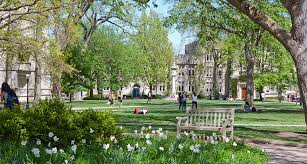Princeton University: A Tradition of Excellence and Innovation
Princeton University: A Tradition of Excellence and Innovation
Nestled in the quaint town of Princeton, New Jersey, Princeton University stands as a symbol of academic rigor, intellectual curiosity, and timeless tradition. Established in 1746, Princeton is one of the oldest and most prestigious universities in the United States, renowned for its commitment to scholarship, research, and community. With a distinguished faculty, a vibrant campus culture, and a legacy of producing influential leaders across various fields, Princeton continues to shape the future of education and global discourse.
A Rich History of Academic Achievement
Founded before the United States was officially established, Princeton University has a rich history steeped in academic excellence. Originally established as the College of New Jersey, Princeton's early years focused on training leaders for colonial America. Over the centuries, the university has evolved into a world-class institution known for its rigorous academic programs in the humanities, social sciences, natural sciences, and engineering.
World-Class Faculty and Research
At the heart of Princeton's academic prowess is its distinguished faculty. Comprising Nobel laureates, Pulitzer Prize winners, MacArthur Fellows, and leading experts in their fields, Princeton's faculty members are not only dedicated educators but also pioneers in cutting-edge research. The university's research endeavors span a wide range of disciplines, from fundamental scientific discoveries to groundbreaking advancements in policy, arts, and humanities.
Commitment to Liberal Arts Education
Princeton's commitment to liberal arts education is central to its academic philosophy. The university emphasizes critical thinking, interdisciplinary approaches, and a broad-based education that prepares students to address complex global challenges. Princeton's undergraduate curriculum encourages exploration across disciplines, allowing students to pursue their intellectual passions while gaining a deep understanding of the interconnectedness of knowledge.
Campus Life and Community Engagement
Princeton's picturesque campus, characterized by historic buildings and scenic landscapes, provides an ideal setting for a vibrant and close-knit community. Students at Princeton engage in a wide range of extracurricular activities, including student organizations, cultural events, community service projects, and athletic programs. The university's commitment to fostering a supportive and inclusive environment enhances the overall student experience and promotes lifelong friendships and connections.
Global Impact and Public Service
Princeton University is dedicated to making a positive impact on society through research, teaching, and public service. The university's research centers and initiatives address pressing global issues such as climate change, public health, inequality, and democracy. Princeton alumni, known as "Princetonians," have made significant contributions as leaders in academia, government, business, and the arts, shaping policy and driving innovation worldwide.
Conclusion
In conclusion, Princeton University stands as a pillar of academic excellence, innovation, and community. With its illustrious history, world-class faculty, commitment to liberal arts education, vibrant campus life, and dedication to global impact, Princeton continues to inspire generations of scholars and leaders. As it looks toward the future, Princeton remains steadfast in its mission to educate the next generation of thinkers and doers who will tackle the world's most pressing challenges and contribute meaningfully to society.
Princeton University not only prepares students for successful careers but also nurtures a lifelong commitment to learning, service, and leadership, ensuring its enduring legacy in the realms of education, research, and public service.






Comments
Post a Comment